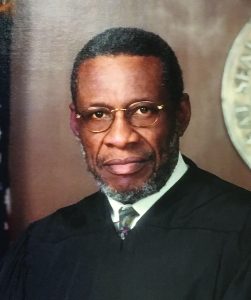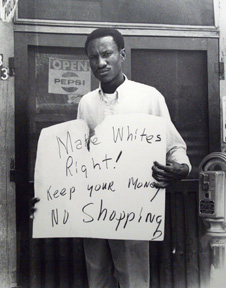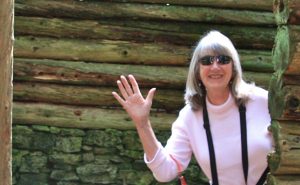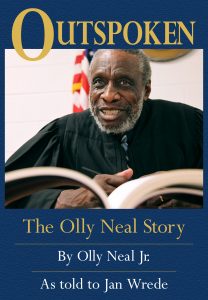calsfoundation@cals.org
A Continuing Struggle for Black Civil Rights in Arkansas: OUTSPOKEN, by Olly Neal Jr.
Many are discussing current issues of police violence, inequality in opportunities and pay, and other problems facing the African American community in the nation and in Arkansas. Olly Neal’s autobiography, just published by Butler Center Books at the Central Arkansas Library System, confronts these same concerns, providing historical context for the protest movements of today.

Born in 1941 on a farm near Marianna in rural eastern Arkansas, Olly Neal Jr. grew up in a large family with parents who insisted on their children getting a good education. Neal had the intellect but not the temperament to be a good student in high school, but a teacher took an interest in him when she saw him steal a book rather than risk his tough-guy reputation if someone saw him checking it out. The teacher drove to Memphis three times to put books on the shelf for Neal to “steal,” fostering his clandestine love of reading. (Hear the story here.) Neal went on to start and lead the Lee County Cooperative Clinic in Marianna during the 1970s, a turbulent time fraught with conflicts between the white power structure and black citizens seeking their civil rights and increased economic opportunities. He became the first black district prosecuting attorney in Arkansas, and served as a circuit court judge and on the Arkansas Court of Appeals. Historian Grif Stockley has characterized Neal as a civil rights activist, political agitator, Arkansas Delta advocate, and “black devil incarnate” to many of Marianna’s whites.
The road to success was not a smooth one. Soon after his young wife died eight days after their wedding, Neal was drafted into the U.S. Army and served two years during the Vietnam War, with six months in Vietnam in 1965–66. He says of that time, “It provided me the structure that helped me get control of my anger—not to get rid of it but get control of it….But there were other things I hadn’t learned.”
Neal earned a chemistry degree from LeMoyne-Owen College in Memphis, Tennessee, in 1974, after having been thrown out of Lane College in Jackson, Tennessee, on false charges of arson only two months before graduation. During this time of racial and political turmoil, he became the first director of the nonprofit Lee County Cooperative Clinic in Marianna, serving until 1978. The clinic remains a prominent community health center.
Neal also led the National Demonstration Water Project, which funded water and sewer systems in impoverished rural counties. During these years, he became a charismatic force of nature and a powerful community organizer. Marianna and the clinic made national news, with Neal and other activists leading a boycott against white merchants in the downtown business district.

At one point, he had a price on his head. The small town saw violent incidents and suffered economic damage during the boycotts, which ended without the activists’ goals being fully achieved, and this set the stage for further unrest. In 1972, soon after precarious integration of the public schools, black students staged a sit-in at the local high school. They requested a program to commemorate Dr. Martin Luther King Jr.’s birthday and the removal of their “unqualified” white principal—another stand that was met with violence.
While leading the clinic, Neal drove to Little Rock for night classes and earned his law degree in 1979 from what is now the University of Arkansas at Little Rock William H. Bowen School of Law. This set him on the path to a modest local law practice with significant success in the courtroom defending criminal cases, as well as activism in Arkansas’s legislative and judicial redistricting that leveled the playing field for black voters. He became a deputy prosecutor and was appointed the state’s first black district prosecuting attorney in 1991. Neal was elected circuit court judge for the First Judicial District and appointed to the Arkansas Court of Appeals, where he served with distinction for eleven years before retiring in 2007. When the First Judicial District fell into disarray in 2010, both the white and black lawyers of eastern Arkansas requested that Judge Neal step in, and he was called back to a popular temporary appointment.

In weekly conversations over several years, Olly Neal told the story of his life to his friend and former colleague Jan Wrede, who captured his words and shaped them into what became his autobiography, OUTSPOKEN. Neal tells his unique story, with humor, candor, and hard-earned wisdom, explaining his rocky journey from humble beginnings in rural Lee County to public health champion and brilliant community organizer, prosecuting attorney, and appellate judge. Along the way, many whites saw him as a threat to their control of the power structure and many blacks saw him as a traitor who was prosecuting and sitting in judgment of his own people. But he emphasized fairness and equal treatment at every opportunity, saying, “The way I got past all of this was by talking to my people about what I did and why, and by telling them how difficult it was for me. And I think that many folks understood me.” Looking back on these years and the people he met along the way, he offers insights into the traumas of the time and the toll they took on his mental and physical health, as well as the relationships that allowed him to face his challenges.
Some praise for OUTSPOKEN:
OUTSPOKEN chronicles the life of Olly Neal Jr. from his beginnings in the Arkansas Delta to becoming the first black district prosecuting attorney in Arkansas and a circuit court judge, and serving on the Arkansas Court of Appeals. It is the upward-bound climb from obscurity to leadership. Through all the disappointment, grief, and struggle of a young man growing up in the segregated South, Olly stayed the course and excelled. A successful life does not equate to an easy life. Olly is a tireless civil rights activist and political agitator who has demonstrated that he has the courage to challenge the status quo.—Congressman Bennie G. Thompson, the longest-serving African American elected official in the state of Mississippi
It has been fifty years since a lanky, profane, and angry young black man with a rap sheet of arrests for civil rights demonstrations across the river in Memphis set out to start a medical clinic for the people of Lee County, Arkansas, where most people were black and poor. Now, in OUTSPOKEN, Olly Neal tells his story. As everyone who has known him would expect, it ain’t pretty, but it’s moving, and it’s helpful reading for anyone who wants to understand Arkansas.—Ernest Dumas, longtime Arkansas journalist and author
Olly Neal’s autobiography provides a vivid and candid narrative of his lifelong commitment to the struggle for black freedom and equality. Neal’s story is not only instructive, valuable, and worthwhile in its own telling, but it is also an important addition to the far too few firsthand accounts of black lives in Arkansas. This book, like Neal, is a true state treasure.—John A. Kirk, the George W. Donaghey Distinguished Professor of History at the University of Arkansas at Little Rock
I had the extraordinary good fortune of working for Olly as medical director of the Lee County Cooperative Clinic in Marianna, Arkansas. I was in awe of Olly’s ability to speak with great and genuine connection to the everyday people of the county—and be as tough as nails with the well-off and powerful. He was always the smartest and most convincing voice in the room. All of this comes through in one of the most compelling memoirs I have read in years! Hard to put down and a real opportunity to take a deep and fascinating dive into one of the most important eras in America’s continuing evolution. Olly was there, and he’ll take you back with him.—Dr. Irwin Redlener, clinical professor of Health Policy and Management and Pediatrics (in the Earth Institute) at Columbia University
Olly was a key leader at a critical moment of transition, when the black community in Marianna came together to assert its collective power. His perspective on the pivotal events of that era—and all that came afterwards—is a welcome addition to the history record. And his personal story, told in a forthright manner, is engaging and authentic—a true reflection of his outspoken and courageous character.—Marianna native Susan Daggett, associate professor of the Practice of Law at Sturm College of Law at the University of Denver
* * *

Get your copy now!
OUTSPOKEN: The Olly Neal Story by Olly Neal Jr., as told to Jan Wrede
Butler Center Books, Central Arkansas Library System
Spring 2020, 349 pages, 6 × 9, 68 images
$29.95 paperback, ISBN 978-1-945624-25-4
The book is available at bookstores in Little Rock and elsewhere; in the Galleries at Library Square inside the CALS Roberts Library in Little Rock; from online retailers; and through the University of Arkansas Press (via University of Chicago Press) at 800-621-2736 or https://www.uapress.com/product/outspoken/.
The June 3 Legacies & Lunch online event with Olly Neal and Jan Wrede is available here: https://youtu.be/ANJJmIaXG1k




